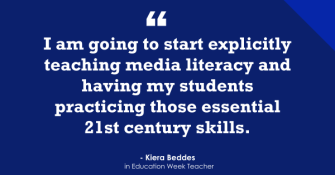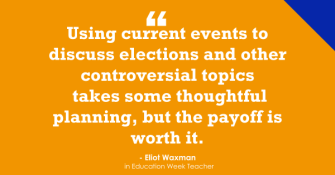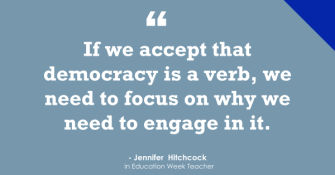(This is the first post in a multipart series.)
The new question-of-the-week is:
How are you handling the aftermath of the presidential election in your classroom now and in the coming weeks and months?
The misinformation around the presidential election is fast-and-furious, and educators teach in communities that voted heavily for Biden AND in communities that voted heavily for Trump.
This series will offer suggestions about how educators can respond to these difficult times.
You might also be interested in an earlier on dealing with “controversial” topics in the classroom.
Today, Sarah Cooper, Kiera Beddes, Eliot Waxman, and Jennifer Hitchcock share their experiences and suggestions.
“Inform rather than persuade”
Sarah Cooper teaches 8th grade U.S. history and is dean of studies at Flintridge Preparatory School in La Canada, Calif. She is the author of two books, (Routledge, 2018) and (Stenhouse, 2009). Sarah speaks at conferences and writes for MiddleWeb’s blog, and she lives just outside Los Angeles with her husband and two sons:
Throughout this fall, the social studies community has been buzzing about how there’s never been a harder or more exciting time to be a history teacher. In the days following the election, though, “harder” won for me, and I nearly gave up talking about it.
Sure, we had a in that liminal, fizzy, who-knows period before the election was called by the Associated Press, Fox News, and most other news outlets on Nov. 8. But in the highly polarized aftermath of that call, what do we as teachers do? I’m nearly at a loss and I’ve been writing and teaching about civics for years.
But we move on, teachable moment to teachable moment. Here’s my best shot right now, in mid-November, as the nation treks toward electors casting their ballots a month from now.
1) Stay local.
Recently, a bright and engaged student asked how politics affects her locally, since so much happens on the national stage. In every way! I said, and since then, have been trying to highlight state and local races as much as national ones.
One especially relevant opportunity came with California’s recent referendum, Proposition 18, on whether 17-year-olds who turn 18 by the November election could vote in the March primary. It didn’t pass, and this was a rare instance where I felt free in class to share my frustration about a political outcome. Why wouldn’t the electorate trust adolescents? I railed in front of 13- and 14-year-olds whom I respect and love.
In addition, though we’re not doing an individual this year during online learning, in favor of a more social group Constitution project, I want to revive the letter in the future. Then I’ll be able, once again, to sit knee to knee with students as they research state Assembly and Senate bills. National politics may catch the headlines, but local decisions have visible impact.
2) Inform rather than persuade.
Usually, I do my best to remain nonpartisan in the classroom, except in , and this fall has convinced me more than ever of the wisdom of this approach.
I’m not going to change my students’ views by telling them what I think. In fact, sharing my own stance might cause issues for them at home as they navigate both their parents’ perspectives and their own emerging political identities.
In their own , students are welcome to inject opinions that follow our school’s honor code (to be honest, kind, generous, and respectful). But these days, when we talk about national current events, I’m trying to focus on pathways, numbers, procedures, rather than commentary, opinions, judgments. This way, I hope students will draw their own conclusions on the path to becoming engaged, voting citizens.
3) Look to the long game of creating citizens.
Recently, on a morning walk, I tapped on an episode of On Being with Krista Tippett called “The Long View, II: On Who We Can Become.” I thought I was taking a break from educational thinking, but it turned out that the guest was Karen Murphy, director of international strategy at Facing History and Ourselves.
As I listened, my mind opened to the future in a way it hadn’t for a while, as I’ve been so present-focused during this pandemic election season.
Tippett observed that Facing History’s work is all about “trusting the moral and civic intelligence of the young,” and Murphy replied that we are “standing in the middle of a bridge and need to decide how to walk across it together and in what direction.” Later Murphy asked: “What is the shared vocabulary we need; what are the words; how do we describe our past?” And, finally, she wondered “why some people stand up in extraordinary ways, and what does that mean for you.”
In a fractured time, this focus on togetherness and upstanding turned out to be just what I needed to keep the faith as a history teacher, to keep on keeping on.

Media literacy
Kiera Beddes has been a high school ELA teacher in Utah for eight years. She is currently a Utah Teacher Fellow and is passionate about social science, ELA, and technology in education:
Now more than ever, we are seeing the ramifications that the current political climate has on our students and our classrooms. The 2020 presidential election was all my senior high school students could talk about in the week after Nov 3rd. I love that they were so invested in the process, as many of them voted for the first time in this election. However, what I saw in my classroom and in the wider realms of social media has raised some serious concerns about media literacy and digital citizenship. French philosopher Voltaire once said, “Certainly anyone who has the power to make you believe absurdities has the power to make you commit injustices.” If we have any desire to live in a functioning society, we need to find a way to curb misinformation, rampant conspiracy theories, and other harmful things found on the internet before they have real-life consequences.
Part of my responsibility as a public school teacher is to prepare my students to be 21st-century learners, to prepare them for a world that is inundated with information, and to prepare them to navigate both online and public forums that are often filled with conflicting perspectives. The 2020 presidential election demonstrated how easily we are distracted by contrasting narratives and how quickly we turn to attacking one another rather than working to find common ground. It also illustrated to me how vital media literacy is in our curriculum and not just as a single lesson or a single class. It needs to be embedded at every possible level.
For my own part, I am going to start explicitly teaching media literacy and having my students practicing those essential 21st-century skills. I will also try to create more opportunities for my students to authentically practice digital citizenship. The line between online and real life isn’t as solid as we like to think. Our behavior online directly influences how we interact with one another in our daily life. After all, as this presidential election has demonstrated, there isn’t really a difference between digital citizenship and becoming IRL citizens. I think the biggest problem that I’ve had in the past when I’ve tried to teach these things is I didn’t make it explicit just how necessary these skills are for everyone in the modern world, but as recent events have illustrated, these skills are absolutely vital — today and for our future.

Soliciting student questions first
Eliot Waxman is an AP U.S. Government, AP Comparative Government, and AP Capstone Research teacher at Oakton High School in Vienna, Va. Prior to becoming a teacher, he worked as a political consultant, helping candidates from state representative to president of the United States:
During an election season, friends and colleagues often say to me, “It must be a great time to be a government teacher.” The truth is it’s always a good time to be a government teacher, especially one who is committed to imbuing lesson plans with students’ curiosity about current events. This is an important distinction since I’ve heard parents and friends complain at social gatherings that their children’s social studies teachers don’t discuss events happening around them. Sadly, it has the chilling effect of turning their children off from enjoying studying social studies and being engaged in the issues that affect them.
I’ve made it a personal goal to never be that type of teacher. Over the last several weeks, I’ve had really informative discussions with students on topics such as faithless electors, political legitimacy, the impact of debates, and free and fair elections. The key to doing this successfully is to have a structure and established ground rules on civil discourse in place beforehand.
For example, prior to our discussions on potentially controversial topics, e.g., impeachment, responses to COVID-19, Election 2020, I ask students to complete a Google Form or Google slide that solicits their questions and/or gauges their level of understanding of the topic. This serves two purposes. First, it gives me a chance to organize and sequence the discussion and keep the class from veering too far off topic. Second, it lets me know at what level I have to begin the discussion, i.e., do I need to provide significant background information or can I assume students are aware of the basic facts. Even advanced students frequently have only a superficial understanding of an event so some background information is necessary.
The emphasis on civil discourse is crucial, and in an era of heightened partisanship, it has become increasingly important. Although I teach in a deep-purple county, not everyone is celebrating Joe Biden’s apparent victory. The NRA headquarters, President Trump’s campaign headquarters, and the Democrat and Republican National Committees are all within a 20-minute drive (longer in D.C. traffic) from my classroom, and emotions continue to be heightened. Many of my students are children of or know the people we see in the news, and their views fall all across the political spectrum. I would be less than honest if I said every discussion has gone smoothly or without partisan emotion. I’ve recently had to address in real time questions or claims that have turned out to be baseless or without evidence. (In one case, I had a parent watching over his daughter’s shoulder;an event made possible due to distance learning.) Still, I’ve tried hard to honor all perspectives and required students to provide evidence to support their opinions and treat each other respectfully. I frequently commend them on their maturity and say that the adults should look to them as role models.
Two specific resources that I used since the election are Street Law’s infographic and Facing History and Ourselves’ lesson plan. The infographic provides factual information in an accessible way, and it has been useful for answering students’ questions, especially as the current transition period has differed from previous ones. The free and fair elections lesson takes a political science approach and asks students to evaluate elections on eight criteria: voter registration, access to reliable information, citizens’ ability to run for office, access to polling places, absence of voter intimidation, lack of fraud, accurate counting and correct reporting of results, and respect for the outcome. It concludes by asking students to reflect on what they and others can do to protect the integrity of elections. Not surprisingly, I found this to be a very good way to allow students to evaluate the claims and counterclaims that are currently circulating using these objective criteria. This helped keep the lesson on a high academic level.
Using current events to discuss elections and other controversial topics takes some thoughtful planning, but the payoff is worth it. Student engagement in these relevant and authentic issues is a key to promoting civic engagement and producing well-prepared and well-informed citizens. It is imperative for us as teachers to pursue this path. The future of our democracy depends on it.

It isn’t a “horse race”
Jennifer Hitchcock teaches AP Government and Politics for Virginia’s Fairfax County public schools, at Thomas Jefferson High School for Science and Technology and the district’s Online Campus. After 15 years of experience in social studies education, she wakes up each day ready to learn new things and share that enthusiasm with her students:
The election of 2020 cast light on the fact that our modern electoral system, the media coverage of elections, and most importantly, how citizens’ talk about elections do not sustain democracy. The biggest problem is our belief that it is a race between two competitors, like Monday Night Football or the World Series. An “us vs them” mentality is disastrous to the labor and activity of democracy.
America’s civics teachers are familiar with the term “horse-race journalism,” which is a criticism of media focusing on differences between candidates that are measurable via polling data, campaign finance, and supporters. The media seek to portray one candidate as a winner while the other is portrayed as a loser. Yet it’s not just in journalism that Americans want the pageantry and drama of a good game.
More problematic is the manner in which Americans play democracy like it is a game—we are brand loyal and we despise the away team in a manner that destroys community, compromise, understanding, and the public good. We have mascots, team colors, sectionalism that feels like countryside claimed for the good guys. Folks hang yard signs, move to regions of the country that are alike in allegiance, and create videos like highlight reels of debates, speeches, and gatherings. All to promote one side over the other while seeing past the humanity of the issue.
In the past, I bought into horse-race journalism but a much broader interpretation of the spectacle of winning and losing an election. I tried to show support for both sides, but I really played into the storyline by focusing on the HOW of democracy—the electoral processes, the party actions, the media coverage. I realize that focusing on this most, especially during the election cycle, promotes a horse-race mentality in my classroom. The message I gave to my students is that what matters is who wins and who loses. In the election of 2020, a record-breaking 78 million votes for Democratic candidate won over a record-breaking 73 million votes for a Republican candidate. In that message, we all lose. If we use the horse-race mentality, all that matters is the 78 million. That mentality suggests that democracy is not about our collective action but the action of a selective few.
I want to change that by starting a different conversation in my classroom. I want to focus on the WHY. If we accept that democracy is a verb, we need to focus on why we need to engage in it. Understanding why we need to be a part of the conversation is a far more important understanding to establish before we get to the ceremonies of self-rule. The spectacle of American democracy needs to start and end with who we are and how we understand each other in an interdependent society. It is the skill of listening to our neighbors instead of trying to vanquish their opinion. It is about helping each other in times of need, visible and invisible, instead of posting signage that both proclaims one’s ideals as well as fails to recognize the ideals and experiences of others. I think the story is WHY did Stacey Abrams work to found Fair Fight and have such a profound impact on the presidential election? Why did voters in Georgia, Pennsylvania, Michigan, Wisconsin, Ohio, Virginia, and everywhere else in the country turn out in record-breaking numbers? What is our purpose moving forward?
That means every corner of civics content should be contextualized, focusing on why democratic structures exist, to whom these structures are beneficial or detrimental, and why those structures continue to exist. Instruction should be about debating the validity of our systems of government as both American heritage and progressive improvement. Classrooms need an environment where finding consensus is as important as respecting each other when we disagree while searching for deeper understanding.

Thanks to Sarah, Kiera, Eliot, and Jennifer for their contributions!
Please feel free to leave a comment with your reactions to the topic or directly to anything that has been said in this post.
Consider contributing a question to be answered in a future post. You can send one to me at lferlazzo@epe.org. When you send it in, let me know if I can use your real name if it’s selected or if you’d prefer remaining anonymous and have a pseudonym in mind.
You can also contact me on Twitter at .
Education Week has published a collection of posts from this blog, along with new material, in an e-book form. It’s titled .
Just a reminder; you can subscribe and receive updates from this blog via or And if you missed any of the highlights from the first eight years of this blog, you can see a categorized list below. The list doesn’t include ones from this current year, but you can find those by clicking on the “answers” category found in the sidebar.
I am also creating a





